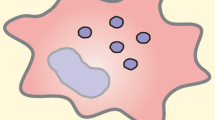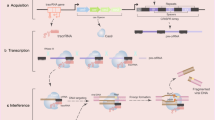Abstract
Brief mild hyperthermia is sufficient to induce apoptosis (programmed cell death) in many cell lines. Here we describe the effects of a number of factors modulating heat shock induced apoptosis outcomes. We report the effects of cell type, heat load, recovery times, cellular growth phase, and protein synthesis on the levels of apoptoses seen in heat stressed cell populations. We observe that a number of cell lines are competent to undergo heat stress induced apoptosis using both the comet assay and cellular and nuclear morphologies. Of the cell lines tested we saw a wide spectrum of sensitivities, ranging from resistant (less than 1% apoptotic after 12 h) to exquisitely sensitive (>95%). By incrementally increasing the heat load from 37–49°C, we observed a gradual increase in apoptosis with a significant change from apoptotic to necrotic death at temperatures beyond 45°C. The kinetics of the apoptotic response to heat shock were also examined. A time dependent increase in apoptotic cell death was seen after initial hyperthermic treatment with most cell types reaching a ‘plateau’ at 18 h. In addition to these parameters we report that growth phase has a strong influence on the number of apoptoses induced as a result of heat stress. Cultured cells, grown to a plateau, undergo apoptosis at a much higher level than similarly treated cells taken during an exponential phase of growth. Finally, we determined the necessity of protein synthesis for apoptotic competency.
Similar content being viewed by others
References
Samali A, Cotter TG. Heat shock proteins increase resistance to apoptosis. Exp Cell Res 1996; 223: 163-170.
Mosser D, Martin LH. Induced thermotolerance to apoptosis in a human T-lymphocyte line. J Cell Physiol 1992; 151: 561-570.
Harmon BV, Takano YS, Winterford CM, Gobe GC. The role of apoptosis in the response of cells and tumors to mild hyperthermia. Int J Radiat Biol 1991; 59: 1075-1081.
Harmon BV, Corder AM, Collins RJ, et al. Cell death induced in a murine mastocytoma by 42-47°C heating in vitro: evidence that the form of death changes from apoptosis to necrosis above a critical heat. Int J Radiat Biol 1990; 58: 845-858.
Barry MA, Behnke CA, Eastman A. Activation of programmed cell death (apoptosis) by cisplatin, other cancer drugs, toxins, and hyperthermia. Biochem Pharmacol 1990; 40: 2352-2362.
Papadimitriou JM, van Bruggen I. Quantitative investigations of apoptosis of murine mononuclear phagocytes during mild hyperthermia. Exp Molec Pathol 1993; 59: 1-12.
Takano YS, Harmon BV, Kerr JF. Apoptosis induced by mild hyperthermia in human and tumor cell lines: a study using electron microscopy. J Pathol 1991; 163: 329-336.
van Bruggen I, Robertson TA, Papadimitriou JM. The effect of mild hyperthermia on the morphology and function of murine resident peritoneal macrophages. Exp Molec Pathol 1991; 55: 119-134.
Gething M, Sambrook J. Protein folding in the cell. Nature 1992; 355: 33-45.
Hahn GM, Li GC. Thermotolerance, thermoresistance, and thermosensitization. In: Morimoto RI, Tissieres A, Georgopoulos C, eds. Stress Proteins in Biology and Medicine. Cold Spring Harbor, New York. 1990: 79-100.
Fairbairn DW, Olive PL, O'Neill KL. The comet assay: a comprehensive review. Mutat Res 1995; 339: 37-59.
Ostling O, Johansen JP. Microelectrophoretic study of radiation-induced DNA damages in individual mammalian cells. Biochem Biophys Res Commun 1984; 123(1): 291-298.
Olive PL, Frazer G, Banath JP. Radiation-induced apoptosis measured in TK6 human lymphoblast cells using the comet assay. Radiat Res 1993; 136: 130-136.
Fairbairn DW, Walburger DK, Fairbairn JJ, O'Neill KL. Key morphological changes and DNA strand breaks in human lymphoid cells: Discriminating apoptosis from necrosis. Scanning 1996; 18: 407-416.
Uzawa A, Suzuki G, Nakata Y, Akashi M, Ohyama H, Akanuma A. Radiosensitivity of CD45RO+ memory and CD45RO-naive T cells in culture. Radiat Res 1991; 137: 225-233.
Fairbairn DW, O'Neill KL. Neutral comet assay is sufficient to identify an apoptotic window by visual inspection. Apoptosis 1996; 1: 91-94.
Strasser A, Anderson RL. Bcl-2 and thermotolerance cooperate in cell survival. Cell Growth Differentiation 1995; 6: 799-805.
Olive PL, Banath JP, Durand RE. Heterogeneity in radiation induced DNA damage and repair in tumor and normal cells using the comet assay. Radiat Res 1990; 122: 86-94.
Olive PL, Wlodek D, Durand RE, Banath JP. Factors influencing DNA migration from individual cells subjected to gel electrophoresis. Exp Cell Res 1992; 198: 259-267.
Olive PL, Banath JP. Detection of DNA double-strand breaks through the cell cycle after exposure to X-rays, bleomycin, etoposide, and 125IdUrd. Int J Radiat Biol 1993; 64: 349-358.
Author information
Authors and Affiliations
Rights and permissions
About this article
Cite this article
O'Neill, K.L., Fairbairn, D.W., Smith, M.J. et al. Critical parameters influencing hyperthermia-induced apoptosis in human lymphoid cell lines. Apoptosis 3, 369–375 (1998). https://doi.org/10.1023/A:1009689407261
Issue Date:
DOI: https://doi.org/10.1023/A:1009689407261




